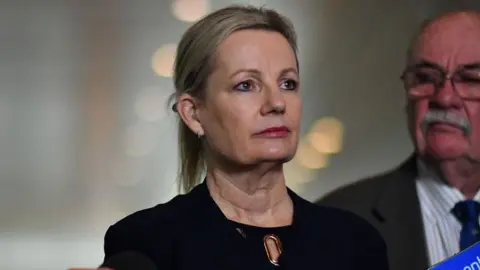In a historic turn of events within Australian politics, the Liberal Party has named Sussan Ley as its first female leader following a significant electoral defeat. Ley, who previously served as deputy leader under Peter Dutton, secured her position by narrowly defeating fellow party member Angus Taylor in a closely contested vote. This leadership shift comes after the Liberal-National coalition experienced what many pundits described as its worst electoral loss in history during the elections held on May 3.
Ley’s rise to leadership is particularly notable as it marks a significant moment for the Liberal Party, an institution that had not seen a woman at the helm until now. The coalition’s election results were dismal, with the Labor Party, led by Prime Minister Anthony Albanese, overwhelmingly winning at least 93 seats, effectively expanding their majority by 16 seats. The Coalition’s tally dropped steeply from 58 to 41, illustrating a dramatic swing in voter sentiment that has raised questions about the future of the party.
Critics of the Coalition’s recent performance attributed the loss to several factors, including divisive leadership styles, a contentious campaign strategy, and policies perceived as overly aligned with extreme right-wing ideology, often described as “Trumpian.” These elements resulted in alienation among demographic groups such as women and younger voters, who felt excluded from the party’s messaging and initiatives.
In her first statements as leader, Ley has emphasized the need for the Liberal Party to reconnect with the Australian public. “Many Australians, including women and younger Australians, feel neglected by the Liberal Party,” she remarked, underscoring her commitment to making the party more inclusive and reflective of contemporary Australian society. Ley’s vision entails not only listening to the community but also enacting meaningful changes that will usher the party into a new era.
Ley has represented the broad regional constituency of Farrer in New South Wales since 2001 and holds extensive experience in various ministerial roles, showcasing a rich career within the party. She is poised to take the reins alongside her newly elected deputy, Ted O’Brien, who previously held the role of energy spokesman and was instrumental in advocating for the party’s controversial nuclear power proposal.
While Prime Minister Albanese’s government continues to be sworn in and solidified, including notable restructuring in key cabinet positions, the Liberal Party faces the dual challenge of regrouping internally while also addressing the concerns of an electorate that has expressed a clear desire for change. The appointment of Ley is a notable first step, signaling an attempt to reshape the party’s image and reconnect with its constituents.
Ley’s personal journey is equally compelling. Originally born in Nigeria to English parents, she was raised in the United Arab Emirates and moved to Australia at a young age. Her diverse background has shaped her character and approach to politics. Interestingly, she changed her name from Susan to Sussan based on numerological beliefs, reflecting her unique and multifaceted personality.
Throughout her career, Ley has traversed a varied path, obtaining degrees in economics and accounting while raising a family. Her professional journey includes experiences in fields ranging from agriculture to aviation, earning her pilot’s license along the way. Her political career, however, has not been without its controversies, facing scrutiny over her use of public resources and her advocacy on contentious issues such as climate change.
The new leadership within the Liberal Party under Ley’s guidance holds the potential for transformative action, responding to the demands for modernization within the party’s ranks. As Australia moves forward under a new political landscape, all eyes will be on Ley’s leadership style and her ability to rally her party and restore faith among the electorate. The coming months will be crucial for both the Liberal Party and the broader Australian political scene as they adapt to changing public sentiments and demands for inclusiveness and open dialogue in political discourse.



